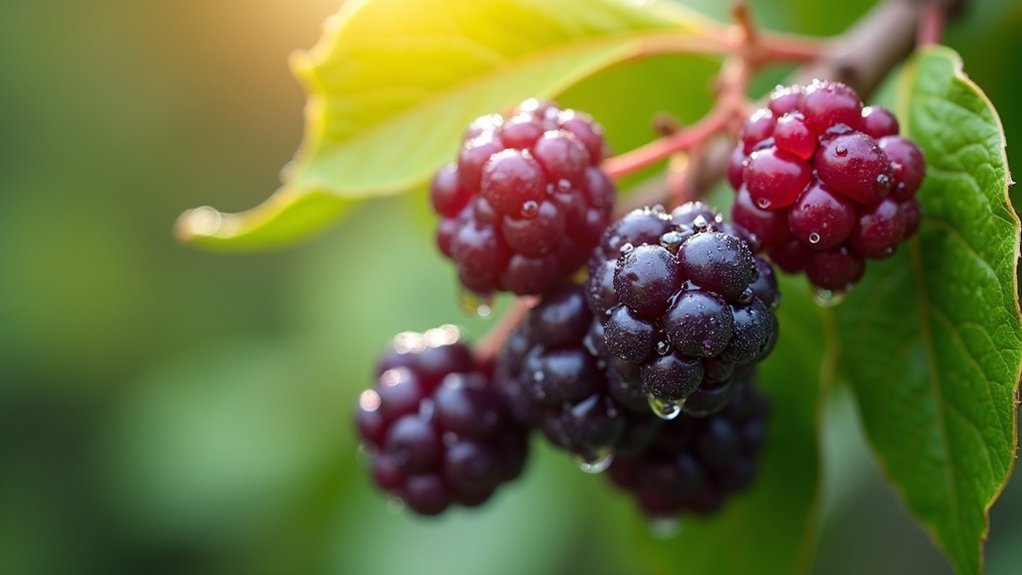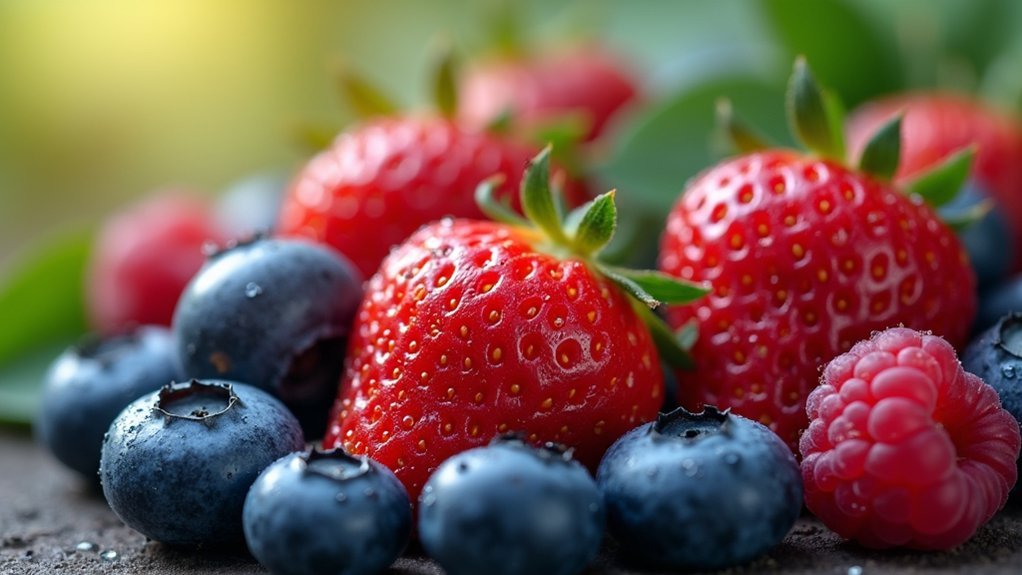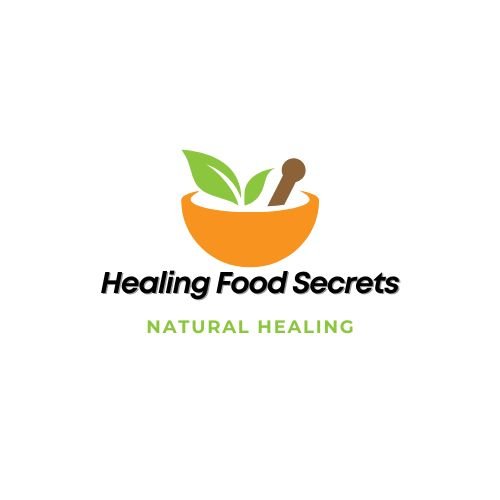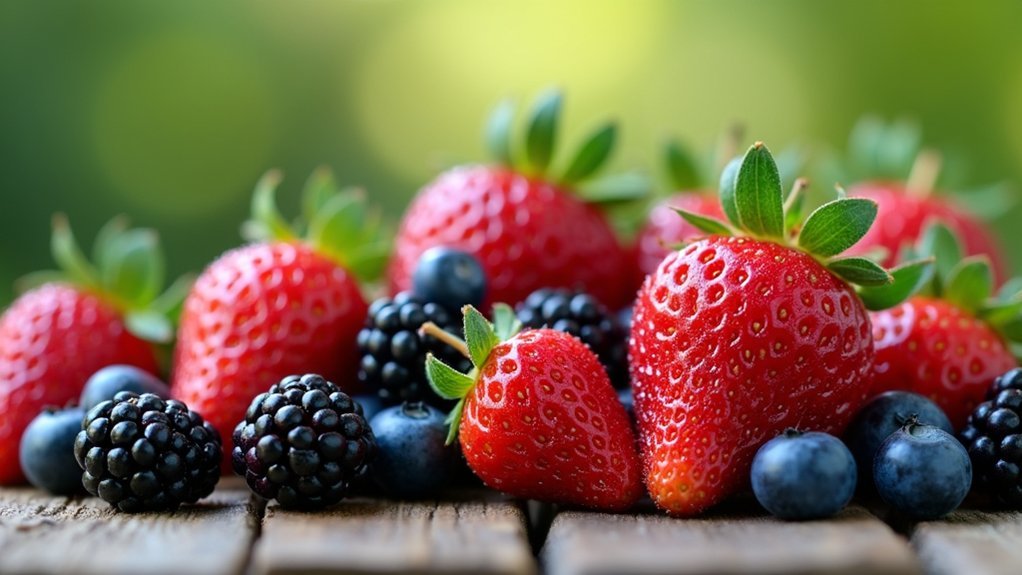You’ll find the most powerful collagen-boosting berries are aronia berries, which directly activate the COL1A1 gene responsible for type I collagen production while simultaneously blocking the matrix metalloproteinases (MMPs) that break down your existing collagen. Anthocyanin-rich blueberries and raspberries also stimulate fibroblast activity, while goji berries enhance skin collagen synthesis and reduce wrinkles. These berries work through dual mechanisms—increasing new collagen formation and protecting existing structures from degradation. Discover the specific dosing protocols that maximize these cellular benefits.
Aronia Berry Extract and Type I Collagen Synthesis

When you’re looking for natural ways to support your skin’s collagen production, aronia berry extract emerges as a powerful ally that directly targets type I collagen synthesis.
This remarkable extract activates COL1A1 transcription, the vital pathway responsible for producing type I collagen in your skin cells. You’ll benefit from its dual action mechanism: it enhances collagen production while simultaneously protecting existing collagen by inhibiting MMP1 and MMP3 enzymes that break down your skin’s structural proteins.
Research shows that aronia extract promotes cell proliferation in dermal fibroblasts without toxic effects, maintaining COL1A1 mRNA stability for sustained collagen production. Studies using 3D dermis models demonstrate that aronia extract creates more realistic cellular interactions compared to traditional flat cell culture methods.
Aronia extract safely stimulates dermal fibroblast growth while preserving collagen mRNA stability for continuous, sustained collagen synthesis.
These concentration-dependent effects improve your skin’s mechanical properties and overall structural integrity.
Phytochemical Compounds That Drive Collagen Production
You’ll find that anthocyanins, the vibrant pigments in berries, actively stimulate your fibroblasts to produce more collagen while creating an ideal cellular environment for synthesis.
Meanwhile, polyphenols work as your skin’s protective shield, neutralizing free radicals that would otherwise break down existing collagen fibers. These compounds specifically inhibit MMP activity, preventing the enzymatic breakdown that accelerates collagen degradation in aging skin.
These two phytochemical powerhouses create a dual-action system that both builds new collagen and preserves what you’ve already got.
Anthocyanins Drive Collagen Synthesis
Behind the vibrant hues of your favorite berries lies a powerful class of phytochemicals called anthocyanins that actively drive collagen synthesis in your skin.
These compounds work by mimicking estrogenic effects, modulating collagen production through estrogen receptor pathways in your body.
When you consume anthocyanin-rich berries like blackcurrants, blueberries, and raspberries, you’re specifically enhancing type I and type III collagen production—the types essential for skin elasticity and firmness.
Research demonstrates that anthocyanins increase collagen gene expression while boosting extracellular matrix proteins like elastin in your skin fibroblasts.
These phytochemicals don’t just stop at collagen.
They’ll also elevate your hyaluronic acid levels, contributing to skin hydration and plumpness while supporting overall tissue regeneration and stability. Additionally, anthocyanins help reduce oxidative stress in your skin cells, protecting against environmental damage that typically breaks down existing collagen structures.
Polyphenols Prevent Collagen Breakdown
While anthocyanins excel at boosting collagen synthesis, polyphenols take a defensive approach by actively preventing your existing collagen from breaking down.
These powerful compounds work through multiple protective mechanisms to preserve your skin’s structural integrity.
When you consume polyphenol-rich berries, you’re delivering targeted protection against collagen degradation:
- Enzyme Inhibition: Polyphenols block collagenase activity and decrease MMP-1 and MMP-3 expression, the primary enzymes responsible for breaking down collagen fibers.
- ROS Defense: Compounds like delphinidin inhibit UV-induced oxidative stress that would otherwise damage your collagen matrix.
- Anti-inflammatory Action: Polyphenols downregulate inflammatory pathways that accelerate collagen breakdown.
This protective shield helps maintain your existing collagen stores while supporting long-term skin health and elasticity. As harmless compounds naturally present in berries, polyphenols offer a safe approach to counteracting skin damage without the risks associated with synthetic alternatives.
Matrix Metalloproteinase Inhibition Through Berry Antioxidants

Matrix metalloproteinases (MMPs) serve as your body’s cellular scissors, breaking down collagen and other proteins in the extracellular matrix. When these enzymes become overactive, they’ll accelerate collagen degradation and compromise your tissue integrity.
Berry antioxidants effectively inhibit MMP activity through multiple mechanisms. Blueberry flavonoids, cranberry proanthocyanidins, and chokeberry polyphenols specifically target MMP-2 and MMP-9—the primary collagen-degrading enzymes.
These compounds don’t just block enzyme activity; they downregulate MMP gene expression by suppressing signaling pathways like ERK 1/2, p38, and JNK.
Studies using THP-1 macrophages and cancer cell lines consistently demonstrate reduced MMP activity when treated with berry extracts. Research on prostate cancer cells shows that blueberry extracts significantly reduce matrix metalloproteinase activity within 24 hours of treatment. By scavenging reactive oxygen species that trigger MMP activation, berry antioxidants protect your collagen matrices from enzymatic breakdown.
Oral Vs Topical Berry Applications for Skin Health
When you’re deciding between oral and topical berry applications, you’ll need to understand how each delivery method affects collagen synthesis differently.
Oral consumption provides systemic benefits through antioxidants like anthocyanins and polyphenols, promoting collagen production from within while offering UV protection. Fresh berries deliver varied phytochemicals, though supplements can also be effective.
Anthocyanins and polyphenols from oral berry consumption work systemically to boost collagen production and provide natural UV protection from within.
Topical applications offer targeted benefits:
- Localized protection – Berry extracts provide direct antioxidant benefits to specific skin areas
- Enhanced barrier function – Topical application improves skin hydration and reduces inflammation
- Fibroblast protection – Blueberry extracts shield dermal fibroblasts from environmental damage
You’ll find that combining both approaches maximizes collagen support. Oral consumption supports overall skin health systemically, while topical treatments address specific areas needing concentrated antioxidant protection and anti-inflammatory benefits. Research demonstrates that berry extracts significantly increase collagen deposition in treated skin areas compared to untreated controls.
Clinical Evidence Supporting Berry-Based Collagen Enhancement

Clinical research has increasingly validated what traditional medicine practitioners have long suspected: berry consumption actively stimulates collagen production and preserves skin integrity.
You’ll find compelling evidence in randomized controlled trials where participants consuming hydrolyzed collagen combined with goji berry, acerola cherry, aloe vera, and chamomile showed significant improvements in facial skin parameters. The data demonstrates clear synergy between berry compounds and collagen supplementation.
When you consume berry-infused collagen beverages, you’re benefiting from altered rheological properties that enhance collagen delivery and function.
Clinical studies reveal that berry polyphenols improve the bioavailability and efficacy of collagen peptides when taken orally. The positive modulation of skin extracellular matrix production by berry bioactives carries low bias risk, indicating reliable scientific support for their clinical use in skin health. Goji berry specifically provides antioxidant properties that may reduce inflammation and actively promote collagen production in skin tissues.
Anthocyanins and Flavanols in Cellular Repair Mechanisms
Deep within berry pigments, anthocyanins and flavanols orchestrate sophisticated cellular repair mechanisms that directly enhance your skin’s regenerative capacity.
These powerful compounds work at the molecular level to combat oxidative stress and inflammation that damages your cells daily.
Anthocyanins demonstrate superior antioxidant activity compared to other flavonoids, while flavanols provide complementary cardioprotective benefits that support overall cellular health. This enhanced antioxidant capacity helps prevent lipid peroxidation and maintain cellular membrane integrity throughout your body.
Together, they create synergistic effects that amplify your body’s natural repair processes.
Key cellular repair mechanisms include:
- Free radical scavenging – Neutralizes harmful oxidative stress that accelerates aging
- Anti-inflammatory pathway inhibition – Blocks NF-κB pathways that trigger cellular damage
- Enhanced cell migration and angiogenesis – Promotes wound healing and tissue regeneration
Through these mechanisms, berry compounds indirectly support collagen health while facilitating thorough cellular repair throughout your body.
COL1A1 Gene Activation and Transcription Pathways
Berry compounds don’t just repair existing cellular damage—they actively stimulate your body’s collagen production machinery at the genetic level.
Berry compounds actively stimulate your body’s collagen production machinery at the genetic level, going beyond simple damage repair.
When you consume berries rich in anthocyanins and flavanols, these compounds influence the COL1A1 gene, which encodes the major component of type I collagen found in your skin, bones, and cartilage.
The TGFβ pathway plays an essential role in regulating COL1A1 through a negative feedback loop mediated by NR4A1. Berry antioxidants can modulate this pathway, potentially enhancing collagen synthesis. Transcription factors like SP1 and KLF6 also participate in controlling COL1A1 expression levels.
Additionally, epigenetic regulators like DNA methyltransferases and HDAC1 influence COL1A1 expression. These regulatory mechanisms guarantee your body produces adequate type I procollagen, which combines to form the strong, cross-linked collagen fibers that maintain tissue strength and elasticity.
UV Protection and Oxidative Stress Defense
Your skin faces constant assault from UV rays that break down precious collagen through oxidative stress and inflammation.
Berries pack powerful antioxidants like ellagic acid and anthocyanins that act as your skin’s natural defense system against this damage.
These compounds don’t just prevent collagen destruction—they actively combat the free radicals and oxidative stress that accelerate aging. Strawberries, raspberries, blueberries, and blackberries serve as an excellent source of vitamin C, which is crucial for pro-collagen production and helps your body synthesize new collagen to replace what’s been damaged.
UV-Induced Collagen Damage
When UV radiation penetrates your skin, it triggers a cascade of damaging processes that directly target your collagen stores. This exposure upregulates matrix metalloproteinases (MMPs) like MMP-1, MMP-3, and MMP-9, which systematically break down your collagen fibers and lead to wrinkles and premature aging.
The damage occurs through multiple pathways that compromise your skin’s structural integrity:
- UVA rays penetrate deep into your dermis, directly impairing collagen production.
- Oxidative stress generates free radicals that accelerate collagen degradation.
- NF-κB pathway activation creates chronic inflammation, amplifying collagen breakdown.
UVB primarily affects your epidermis, but the combined impact of both wavelengths creates a perfect storm for collagen destruction. The UV exposure also activates MAPK signaling pathways, which further amplify tissue damage and cellular stress responses throughout your skin’s structure.
Understanding these mechanisms helps you appreciate why protective strategies are essential for maintaining healthy collagen levels.
Antioxidant Berry Protection
While UV radiation wages war on your collagen, berries offer a powerful defensive arsenal through their concentrated antioxidant compounds.
Blueberries, blackberries, and raspberries contain the highest antioxidant activity among commonly consumed fruits, making them exceptional defenders against oxidative stress.
Ellagic acid, found abundantly in strawberries and raspberries, blocks matrix metalloproteinase production—the enzymes that break down your collagen.
When applied topically, this compound prevents wrinkle formation and photo-aging by maintaining your skin’s structural integrity.
Maqui berries provide particularly potent protection, with extracts demonstrating remarkable antioxidant properties that maintain cell viability in skin fibroblasts exposed to UVB radiation.
These polyphenol-rich berries act as natural chemoprotectants, reducing inflammation and preventing UV-induced collagen destruction while supporting your skin’s elasticity and resilience. Research conducted on hairless mice exposed to UV-B radiation for eight weeks demonstrated that daily topical ellagic acid application significantly reduced wrinkle development compared to untreated subjects.
Oxidative Stress Prevention
Because oxidative stress accelerates collagen breakdown at the cellular level, berries function as your skin’s first line of defense against this molecular damage.
UV rays trigger oxidative stress that destroys skin cells and leads to chronic dermatological disorders, but specific berry extracts offer powerful photoprotection mechanisms.
Aronia extract demonstrates remarkable protective abilities by reducing MMP1 and MMP3 enzymes that degrade collagen while maintaining structural integrity.
Vitis vinifera L. berries provide direct UV protection, shielding your skin from harmful radiation damage. Research indicates that oral supplementation of specific berry-derived compounds may enhance these protective effects on skin physiology.
Key oxidative stress prevention benefits include:
- Enhanced collagen stability through reduced matrix metalloproteinase activity
- Direct UV photoprotection from berry compounds like anthocyanins
- Cellular defense activation that preserves existing collagen structures
You’ll maintain healthier skin by incorporating these protective berries into your daily routine.
Goji and Schisandra Berries in Commercial Formulations
As the beauty and wellness industries increasingly seek natural ingredients with proven benefits, goji and schisandra berries have emerged as powerful components in commercial collagen-supporting formulations.
You’ll find goji berries in collagen beverages where their antioxidants enhance skin collagen production and reduce wrinkles. Schisandra extract appears in skincare products because it stimulates collagen synthesis while inhibiting collagenase activity that breaks down existing collagen.
When you combine these berries, they create synergistic antioxidant effects that better protect your cells from damage. The five-flavored berry schisandra is particularly valued for its unique ability to affect multiple organ systems while supporting cellular repair and regeneration.
You can access their benefits through supplements, powders, and cosmeceutical products. Their bioactive compounds vary by region and processing methods, affecting potency, so you’ll want to choose quality formulations that maximize their collagen-supporting properties.
Dose-Dependent Effects and Optimal Berry Concentrations
You’ll find that berry extracts demonstrate a clear dose-dependent relationship in boosting collagen synthesis, with studies showing increased benefits as concentrations rise from 10-100 μg/ml in laboratory settings.
However, you’re facing a significant challenge: researchers haven’t established standardized dosing protocols for real-world applications, whether you’re considering topical creams or oral supplements.
Your best approach involves understanding that while higher concentrations generally produce better results up to a saturation point, the ideal doses for human skin care remain under investigation. Since collagen requires vitamin C for its triple helix formation, berry-based interventions may support this essential structural process through their naturally high ascorbic acid content.
Concentration-Response Relationship Studies
When researchers study how berry extracts affect collagen production, they’ve discovered that concentration matters considerably—and the relationship isn’t always straightforward.
You’ll find that higher concentrations of aronia extract consistently increase collagen synthesis in human skin fibroblasts while simultaneously reducing harmful matrix metalloproteinases (MMPs) that break down collagen.
The most compelling concentration-response patterns you should know include:
- Aronia extract shows dose-dependent increases in both collagen production and cell proliferation across monolayer and 3D skin models
- Strawberry and CoQ10 combinations at 50 μg/mL each optimize mitochondrial function while reducing inflammatory biomarkers
- Berry extract pre-treatments at 60-100 μg/mL effectively inhibit cellular damage pathways like STAT3, Akt, and ERK1/2
These findings demonstrate that you can’t simply assume more is always better. Studies reveal that chokeberry extracts containing 65.74% total polyphenols provide optimal protection against collagen degradation even when facing toxic metal exposure over extended periods.
Optimal Dosing Protocols
Understanding how much matters as much as knowing what works. You’ll find that berry dosing for collagen support varies greatly based on delivery method and concentration.
For topical applications, you can use concentrations around 2 mg/cm² or 50 μg/mL of strawberry extract in formulations. These concentrations have shown effectiveness in reducing oxidative stress and supporting skin health parameters.
When consuming berries orally, there’s no standardized dosage for collagen support. Instead, focus on incorporating a variety of berries into your daily diet to maximize antioxidant intake and vitamin C content, which directly supports collagen synthesis. The ideal daily intake is between 5-20 grams of collagen to support overall health benefits when combining berry consumption with direct collagen supplementation.
You’ll achieve better results by combining berry extracts with other nutrients like CoQ10 or collagen supplements. This synergistic approach enhances the antioxidant effects while creating an ideal environment for collagen production and cellular health.
Frequently Asked Questions
Can People With Berry Allergies Safely Use Collagen Supplements Containing Berry Extracts?
You shouldn’t use collagen supplements containing berry extracts if you’re allergic to berries. They can trigger allergic reactions including rashes, swelling, or anaphylaxis. Always read labels and consult your healthcare provider first.
How Long Does It Take to See Visible Skin Improvements From Berry-Enhanced Collagen Products?
You’ll notice subtle skin improvements like increased hydration within 2-4 weeks. More pronounced results appear around 8 weeks, with 96% of users reporting visible improvements. Full benefits typically develop between 3-6 months of consistent use.
Do Frozen or Dried Berries Provide the Same Collagen Benefits as Fresh Berries?
You’ll get similar collagen benefits from frozen and dried berries as fresh ones. Frozen berries retain nutrients well, while properly dried berries concentrate beneficial compounds, maintaining their collagen-supporting properties effectively.
Are There Any Drug Interactions With Medications When Using Berry Collagen Supplements?
You should consult your healthcare provider before using berry collagen supplements with medications. While there’s no specific evidence of direct interactions, unknown effects are possible, especially with other supplement ingredients.
Which Berries Should Diabetics Avoid Due to High Sugar Content in Formulations?
You shouldn’t avoid any specific berries due to high sugar content since they’re naturally low-glycemic. However, you should avoid berry juices and processed berry formulations that contain added sugars.
In Summary
You’ll maximize your collagen production by incorporating aronia, goji, and schisandra berries into your daily routine. These berries activate your COL1A1 genes, inhibit matrix metalloproteinases, and protect against UV damage through powerful antioxidants. You can take them orally as supplements or apply topical formulations for targeted skin benefits. Start with clinically-proven doses and you’ll see measurable improvements in your cellular support and skin health within weeks of consistent use.





Leave a Reply